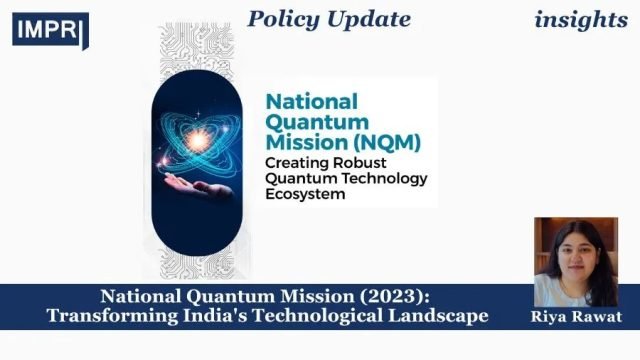Policy Update
Riya Rawat
Background
The National Quantum Mission (NQM), approved by the Union Cabinet on April 19, 2023, with a total outlay of ₹6,003 crore over eight years, reflects India’s ambitious bid to lead the global quantum revolution. The mission has been launched by the Department of Science and Technology (DST) and coincides with global initiatives like World Quantum Day, celebrated annually on April 14, to promote awareness and appreciation of quantum science and technology. India’s observance of World Quantum Day in 2024 highlights its resolve to advance in this field, recognizing quantum technology’s transformative potential across sectors.
The foundation of the mission lies in quantum mechanics, the study of atomic and subatomic particles, which has evolved into engineering applications enabling technologies like LEDs, lasers, and ultra-precise atomic clocks in GPS systems. Today, quantum principles are leveraged for cutting-edge advancements in computing, communication, and sensing. The NQM builds upon prior initiatives, such as the QuEST program, and aligns with national priorities under “Make in India” and “Atmanirbhar Bharat” to seed, nurture, and scale up research and innovation ecosystems.
Functioning
The NQM’s execution is structured through a hub-spoke-spike model, overseen by a Mission Governing Board (MGB) and the Mission Technology Research Council (MTRC). Thematic Hubs (T-Hubs) form the backbone of this model, addressing quantum-specific domains such as computing, communication, sensing and metrology, and materials and devices. In January 2024, the government issued a call for pre-proposals to establish these hubs, inviting contributions from premier academic institutions and R&D labs. Prof. Abhay Karandikar, Secretary of the Department of Science and Technology, emphasized the importance of these hubs in pooling nationwide talent for collaborative innovation.
The mission also seeks to support start-ups and industry collaborations, with funding opportunities ranging from ₹10–25 crore for quantum projects. These investments aim to develop indigenous quantum technologies, including scalable quantum computers and a secure communication network spanning 2,000 km. Additionally, NQM promotes ethical and inclusive development through engagement with diverse stakeholders, ensuring sustainable growth in quantum technology.
During the India-Israel Innovation Meet, Indian Science and Technology Minister Jitendra Singh invited Israeli startups to participate in NQM initiatives. This partnership aims to leverage Israel’s strengths in advanced quantum technologies, such as middleware solutions and operational systems for quantum computing, to complement India’s focus on foundational infrastructure and workforce development. Such synergies are expected to accelerate advancements in quantum computing, encryption, and sensing technologies.
Additionally, NQM fosters international collaborations with leading quantum nations. For example, partnerships with the United States and European Union focus on joint research, technology exchanges, and infrastructure sharing. These collaborations are crucial for strengthening India’s quantum ecosystem and integrating its efforts with global advancements in quantum science and technology.
Performance
The National Quantum Mission has achieved remarkable milestones:
- Quantum Computing: India is advancing scalable quantum computing platforms leveraging superconducting and photonic technologies. The mission has set a target to develop systems ranging from 50 to 1,000 qubits by 2031, with specific focuses on achieving high levels of fidelity and coherence. Recent experiments include quantum algorithms designed for optimization and AI applications.
- Quantum Communication: India has made significant strides in secure quantum communications, with successes in both fiber-based and free-space domains. Through the mission, the nation aims to develop a country-wide quantum key distribution (QKD) network, utilizing satellites as trusted nodes and establishing a robust infrastructure for long-distance secure communication.
- Human Capital Development: Collaborations with institutions like the All India Council for Technical Education (AICTE) have resulted in introducing quantum-focused curricula at undergraduate levels, ensuring a pipeline of skilled professionals. Faculty training programs and well-equipped lab facilities further strengthen capacity building.
- Global Engagements: Prof. Ajay Kumar Sood, Principal Scientific Adviser to the Government of India, highlighted India’s growing stature in quantum research on World Quantum Day 2024, stressing its importance for economic growth, secure communication, and advanced sensing applications. He underscored the necessity of public and private investment in quantum technologies, reflecting global trends.
Several quantum start-ups have achieved notable milestones, including partnerships with global firms and securing funding rounds to develop practical quantum applications. For instance, Indian start-ups have introduced prototypes for quantum sensing devices and cryptographic tools, enhancing the overall ecosystem.
Impact
The National Quantum Mission is set to redefine India’s technological and economic landscape:
- Strategic Security: Advanced quantum cryptography secures sensitive national infrastructure, including banks and power grids. Dr. Ajai Chowdhry, Chairman of the MGB, stressed the importance of quantum encryption in protecting critical institutions, asserting that NQM will ensure India’s technological sovereignty in this domain.
- Healthcare and Drug Discovery: Quantum simulations enable faster and more precise modeling of molecular interactions, accelerating breakthroughs in personalized medicine and drug development, particularly for neglected diseases. This could transform how India addresses global health challenges.
- Economic Competitiveness: Indigenous development of quantum technologies reduces reliance on imports, fosters innovation, and boosts India’s position in the global technology ecosystem.
- Leadership in Global Quantum Internet: Prof. Urbasi Sinha, India’s representative in the World Quantum Day network, highlighted the mission’s ambition to lead global efforts in quantum communication. She envisions India connecting with international quantum networks, achieving leadership in a future global quantum internet.
- Partnership with Israel: Israel’s expertise in software and hardware solutions aligns well with India’s goals of developing scalable quantum computers and secure communication networks. For instance, Israeli companies bring advanced tools for quantum programming and operational control, which are instrumental for India’s ecosystem.
International collaborations with the United States, European Union, and other nations with strong quantum research programs are also instrumental. These partnerships not only enhance India’s technological capabilities but also open new avenues for research, development, and global quantum networking.
Emerging Issues and possible resolutions
Despite its promise, the National Quantum Mission faces several challenges:
- Insufficient Research Infrastructure:
- Issue: A lack of centralized facilities for large-scale quantum experiments slows progress.
- Solution: Establish National Quantum Centers equipped with cutting-edge experimental setups, fabrication labs, and simulation platforms.
- Talent Scarcity and Brain Drain:
- Issue: India faces a shortage of experts in quantum mechanics, engineering, and computer science. Furthermore, trained professionals often migrate abroad due to limited opportunities domestically.
- Solution: Introduce advanced quantum research programs in leading universities, establish scholarships for quantum studies, and provide competitive incentives to retain talent.
- Limited Industry Participation:
- Issue: Indian industries lack sufficient participation in the quantum technology space.
- Solution: Foster industry-academia collaboration by incentivizing private investments, offering tax benefits, and ensuring technology transfer mechanisms to enhance industrial engagement.
- Global Competition and Funding Gap:
- Issue: Other nations, such as the US, China, and the EU, allocate significantly larger funds to quantum R&D, placing India at a comparative disadvantage.
- Solution: Leverage international collaborations for joint projects and secure additional funding through public-private partnerships (PPPs).
- Ethical and Regulatory Challenges:
- Issue: The rapid development of quantum technologies raises concerns about ethical use, privacy, and potential misuse.
- Solution: Establish comprehensive regulations to govern the responsible deployment of quantum technologies while balancing innovation and societal impact.
Way Forward
The National Quantum Mission lays the foundation for India’s leadership in quantum technologies, but achieving this vision requires strategic initiatives. The government must ensure the timely establishment of T-Hubs and promote collaborative innovation among academia, start-ups, and industry. Investments in human capital through enhanced education programs and global fellowships will attract and retain quantum talent. Ethical frameworks must address emerging concerns, as highlighted by Prof. Sood, ensuring secure and inclusive quantum adoption. Lastly, fostering international collaborations will amplify India’s quantum capabilities, strengthening its role in global quantum networks. By focusing on these strategies, India can unlock the full potential of quantum science for national prosperity and global leadership.
The National Quantum Mission marks a transformative step in India’s journey toward technological sovereignty. By prioritizing strategic investments, fostering international partnerships, and addressing emerging challenges, the mission positions India as a key player in the quantum revolution. As quantum technologies continue to shape the future of communication, security, and computation, India’s proactive approach ensures its relevance and leadership in this rapidly evolving domain.
References
- Principal Scientific Adviser, Government of India. (n.d.). National Quantum Mission Overview. Accessed from https://www.psa.gov.in/mission/national-quantum-mission/26
- The Indian Express. (2023). Explained: National Quantum Mission. Accessed from https://indianexpress.com/article/explained/explained-sci-tech/national-quantum-mission-why-india-has-a-lot-of-catching-up-to-do-9458086/
- The Indian Express. (2023). How Quantum Technologies Can Benefit Different Sectors. Accessed from https://indianexpress.com/article/upsc-current-affairs/upsc-essentials/how-quantum-technologies-can-benefit-different-sectors-upsc-9585865/
- Press Information Bureau. (2023). National Quantum Mission Announced by Union Cabinet. Accessed from https://pib.gov.in/PressReleaseIframePage.aspx?PRID=2083199
- Department of Science and Technology. (2023). DST and AICTE Announce Undergraduate Courses in Quantum Technologies. Accessed from https://dst.gov.in/dst-along-aicte-announces-undergraduate-courses-quantum
- The Hindu. (2023). What is the Quantum Satellite for India’s National Quantum Mission?. Accessed from https://www.thehindu.com/sci-tech/science/what-is-the-quantum-satellite-for-indias-national-quantum-mission-explained/article69003757.ece
- Analytics India Magazine. (2023). Why India Needs a Quantum Mission. Accessed from https://analyticsindiamag.com/ai-features/why-india-needs-a-quantum-mission/
- NDTV. (2023). India’s National Quantum Mission: Catching Up With China. Accessed from https://www.ndtv.com/india-news/with-sharp-eye-on-china-indias-national-quantum-mission-is-catching-up-6025114
- Times of India. (2023). India’s Quantum Computing Research Needs a Boost. Accessed from https://timesofindia.indiatimes.com/technology/times-techies/indias-quantum-computing-research-needs-a-boost/articleshow/111620020.cms
- The Hindu BusinessLine. (2023). India’s First Quantum Computer Set for Launch Under National Quantum Mission. Accessed from https://www.thehindubusinessline.com/info-tech/indias-first-quantum-computer-set-for-launch-under-national-quantum-mission/article68566042.ece
- The Quantum Insider. (2024). India’s National Quantum Mission Invites Israeli Startups. Accessed from https://thequantuminsider.com/2024/12/06/indias-national-quantum-mission-invites-israeli-startups-building-global-partnerships-for-quantum-technologys-future/
- Business World. (2024). Technology Day Special: Inside India’s National Quantum Mission. Accessed from https://www.businessworld.in/article/technology-day-special-inside-india’s-national-quantum-mission-519331
- Daily Excelsior. (2024). National Quantum Mission Key to Realising India’s 2047 Vision. Accessed from https://www.dailyexcelsior.com/national-quantum-mission-key-to-realising-india-2047-vision-dr-jitendra/
- Department of Science and Technology. (2023). India Has Produced Over 40 Quantum Technology Startups in 2 Years. Accessed from https://dst.gov.in/india-has-produced-over-40-quantum-technology-start-ups-2-years-few-them-global-potential-says-dr
- The Hindu BusinessLine. (2023). National Quantum Mission Tees Off with ₹427 Cr Budgetary Support. Accessed from https://www.thehindubusinessline.com/news/science/national-quantum-mission-tees-off-with-427-cr-budgetary-support/article68444734.ece
About the Author: Riya Rawat is a researcher at the Impact and Policy Research Institute (IMPRI), pursuing a second master’s degree in Political Science. With a strong background in public policy, gender studies, and international relations, her research interests focus on policy development, analysis, and global affairs.
Acknowledgement: The author extends sincere gratitude to Dr. Arjun Kumar and Aasthaba Jadeja for their invaluable guidance and support. Special thanks to Kirti Ranjan and Furooz Shamas for their assistance in reviewing the article and providing insightful suggestions.
Read more at IMPRI:



















